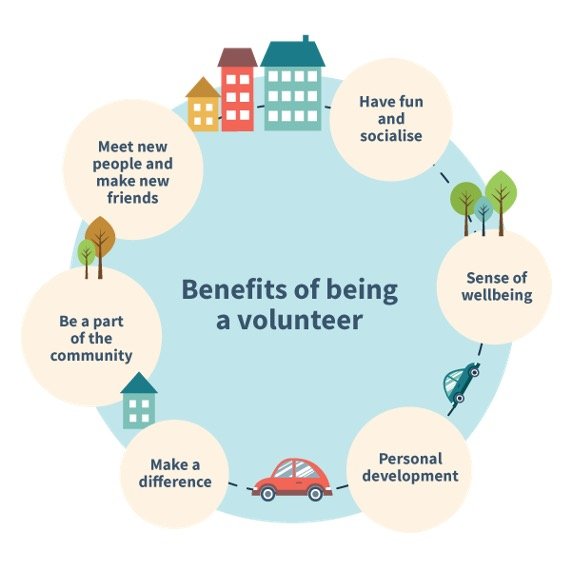The Benefits of Volunteering
Volunteering is a selfless act that brings numerous benefits to both individuals and communities. In this article, we will explore the various advantages of volunteering and how it can positively impact your life and the lives of others.
Making a Difference
One of the most significant benefits of volunteering is the opportunity to make a real difference in the world. By dedicating your time and skills to a cause you care about, you can actively contribute to positive change. Whether it’s working with children, helping the elderly, or supporting environmental initiatives, your efforts can have a lasting impact on the lives of those in need.
Personal Growth
Volunteering offers immense personal growth opportunities. It allows you to step out of your comfort zone, develop new skills, and gain valuable experiences. You may find yourself working in diverse teams, improving your communication and problem-solving abilities, and enhancing your leadership skills. These personal developments can greatly benefit your professional and personal life.
Building Relationships
Volunteering provides an excellent platform to meet new people and build meaningful relationships. You will have the chance to connect with like-minded individuals who share your passion for making a difference. These connections can lead to lifelong friendships, networking opportunities, and a sense of belonging to a community that shares your values.
Enhanced Well-being
Engaging in volunteer work has been linked to improved mental and physical well-being. When you help others, it releases feel-good hormones such as oxytocin and endorphins, which can boost your mood and reduce stress levels. Additionally, volunteering can provide a sense of purpose and fulfillment, leading to increased happiness and overall life satisfaction.
Skill Development
Volunteering offers a unique chance to develop and refine a wide range of skills. Depending on the type of volunteer work you engage in, you can acquire skills such as project management, event planning, fundraising, teaching, and many others. These skills are not only valuable for your personal growth but can also enhance your resume and make you more marketable in the job market.
Increased Empathy and Understanding
Through volunteering, you gain a deeper understanding of the challenges faced by others, fostering empathy and compassion. By working closely with individuals from different backgrounds, cultures, and circumstances, you develop a broader perspective and become more open-minded. This increased empathy can positively impact your relationships, both personally and professionally.
Creating Social Change
Volunteering plays a vital role in creating social change and addressing societal issues. By actively participating in volunteer activities, you contribute to raising awareness, advocating for change, and supporting marginalized communities. Your efforts can inspire others to get involved and create a ripple effect, leading to significant and lasting social impact.

FAQs about Volunteering
1. What are the benefits of volunteering?
Volunteering offers numerous benefits such as:
Helping others in need
Developing new skills
Building a strong network
Gaining valuable work experience
Boosting self-confidence
Improving physical and mental well-being
Contributing to a cause you care about
Increasing cultural awareness
Creating a sense of fulfillment and purpose
Enhancing your resume or college applications
2. Can volunteering to improve my professional skills?
Absolutely! Volunteering allows you to develop and enhance various skills such as communication, teamwork, problem-solving, leadership, and time management. These skills can be valuable in both personal and professional settings.
3. How does volunteering benefit my community?
Volunteering plays a crucial role in strengthening communities. It helps address social issues, supports local organizations and initiatives, and contributes to the overall well-being and development of the community.
4. Can volunteering help me make new friends?
Yes, volunteering provides an excellent opportunity to meet new people who share similar interests and values. It allows you to build meaningful connections and create lasting friendships.
5. Is volunteering only for young people?
No, volunteering is for people of all ages. There are volunteering opportunities available for children, teenagers, adults, and seniors. Everyone can contribute their time and skills to make a positive impact.
6. Can volunteering help me find a job?
Volunteering can increase your chances of finding a job. It provides you with valuable work experience, helps you expand your professional network, and demonstrates your commitment and dedication to potential employers.
7. How much time do I need to commit to volunteering?
The time commitment for volunteering varies depending on the organization and the specific role. Some opportunities may require a few hours per week, while others may require a more significant time commitment. It’s essential to discuss your availability and preferences with the organization you choose to volunteer with.
8. Can I volunteer while working or studying?
Yes, many volunteering opportunities offer flexible schedules that can accommodate your work or study commitments. You can choose roles that allow you to volunteer during weekends, evenings, or even remotely, depending on your availability.
9. How do I find volunteering opportunities?
You can find volunteering opportunities through various channels, including local nonprofit organizations, community centers, online platforms, schools, religious institutions, and volunteer coordination websites. You can also reach out to organizations directly to inquire about available opportunities.
10. Do I need any specific qualifications to volunteer?
Most volunteering opportunities do not require specific qualifications. However, certain roles or projects may require particular skills or expertise. It’s essential to review the requirements mentioned in the volunteer position descriptions or communicate with the organization to determine if any qualifications are necessary.
In conclusion, the benefits of volunteering are multifaceted and extend to both individuals and communities alike. Volunteering not only allows individuals to make a positive impact on the world but also offers numerous personal advantages. It fosters personal growth, develops valuable skills, and provides a profound sense of purpose. Beyond the individual level, volunteering strengthens communities, fosters social cohesion, and addresses critical societal needs. It is a testament to the incredible power of human generosity and the idea that by helping others, we can help ourselves in the process, creating a more compassionate and vibrant world for all.




